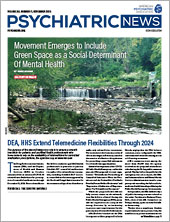I am delighted to report that our first addiction psychiatry presidential theme campaign, which focused on
vaping, has been concluded with great success. My thanks go to Dr. Smita Das, Dr. Tauheed Zaman, Bob Ensinger, Kristin Kroeger, and the incredible APA administration for spearheading this multiprong effort that is making a real difference. The focus of our yearlong campaign on addiction psychiatry in this quarter of my presidency is opioids.
As psychiatrists, we understand that opioid addiction has been one of the most devastating and persistent public health crises of the 21st century, and one that has exacted an immense cost in lives lost. According to
estimates from the Department of Health and Human Services (HHS), more than three-quarters of a million people have died from opioid overdoses since 1999. Those sobering numbers make it even more urgent that we increase public education around opioids, including (1) the availability of safe and very effective treatments; (2) how doctors (not just psychiatrists) can be encouraged to use them; and (3) how patients, their families, and their friends can find the best way to access them. That is why the focus of our campaign is on socializing the message that the diagnosis and treatment of opioid use disorder (OUD) is
simple and works wonderfully when our patients can access it.
We are lucky to live in a time of incredible advancement in psychopharmacology that has established the safety and effectiveness of medications like naloxone and buprenorphine. These agents are lifesaving: naloxone for reversal of opioid overdose and buprenorphine (methadone or naltrexone) for treatment of OUD. Regardless of whether medication is paired with counseling and psychotherapy, they reduce the risk of relapse and take patients on the path to lasting recovery.
What’s heartbreaking is that although OUD is one of the most treatable illnesses, only 1 in 4 people with OUD receives treatment.
We are working to confront the systemic barriers and knowledge gaps that prevent people from being able to access the care they need. Not nearly enough Americans know what treatments are legal and available to them to reverse overdoses and treat opioid addiction. Perhaps most importantly, they do not know how straightforward and effective they are. This includes physicians, many of whom are still unsure of their potential liability in administering buprenorphine despite a recent regulatory change that allows all practitioners with a current DEA Schedule III registration to prescribe treatment for OUD. (See an
in-depth report on OUD, which includes information about this change.)
One of the results of
convening our partner organizations for a major meeting at APA headquarters this past July was a commitment to promote resources from our various organizations and work collaboratively on messaging to the general public. The first example of this is a “Top 10 Things Everyone Should Know About Addiction” infographic, which is set to be released later this month.
Collaboration has been a central focus of these addiction psychiatry campaigns. Our efforts to educate the public and our lawmakers around the risks of opioid use have the best chance at success by APA and our partner organizations speaking with one voice. With our combined efforts, and by leveraging the expertise and passion of our members, I know we will move the needle on the U.S. opioid epidemic. ■

